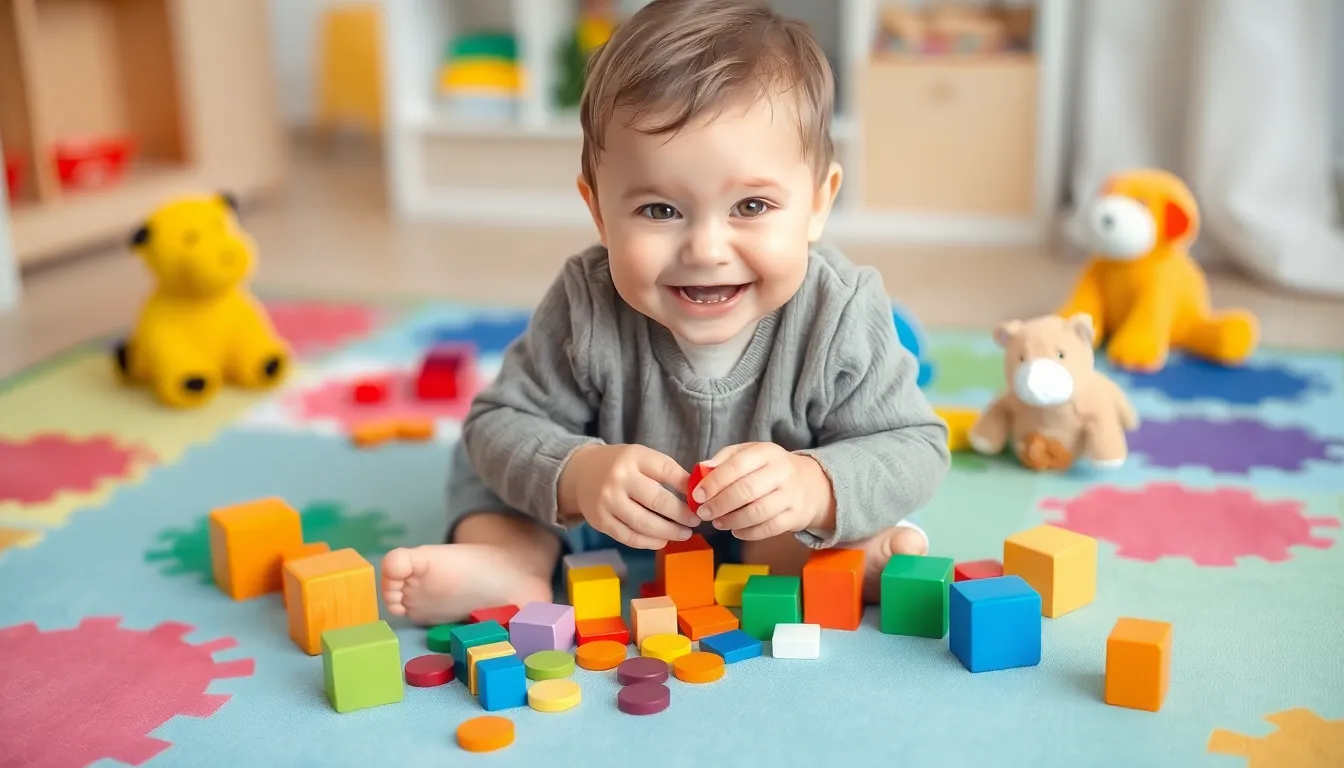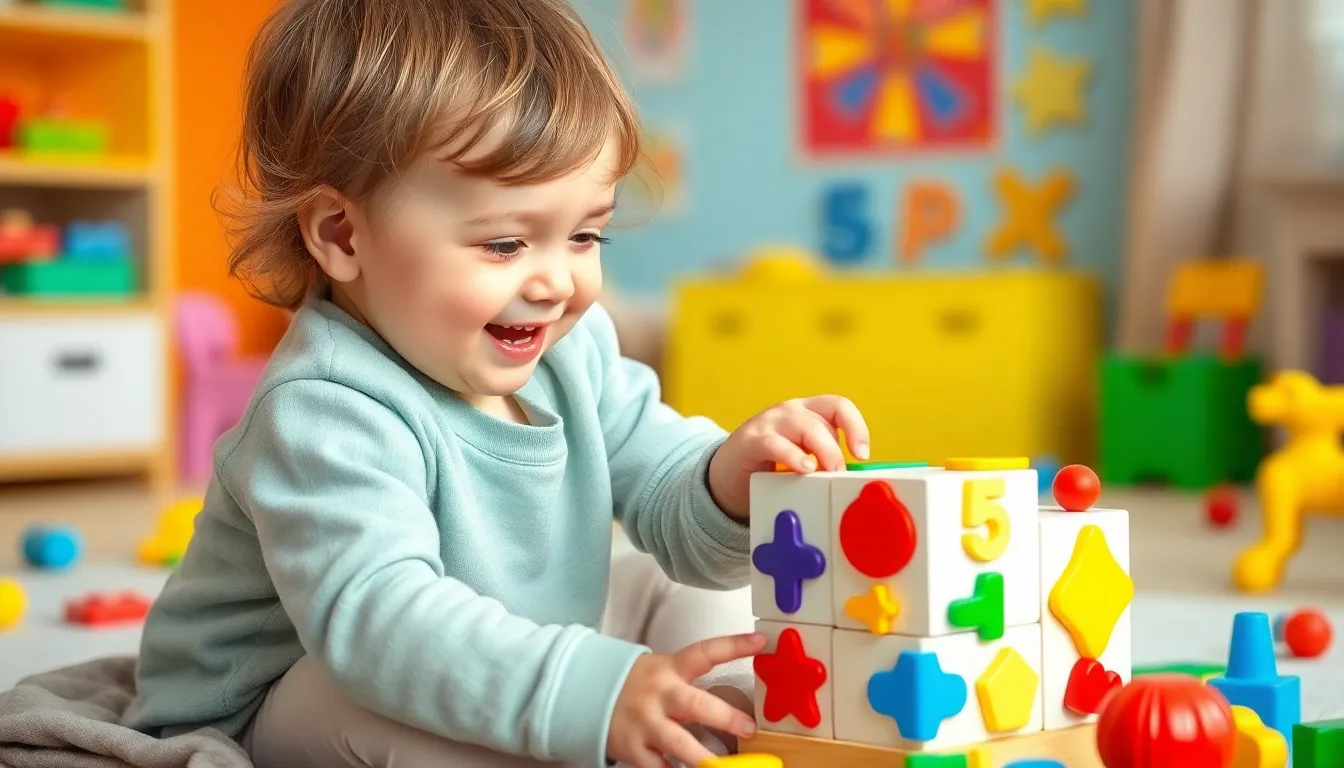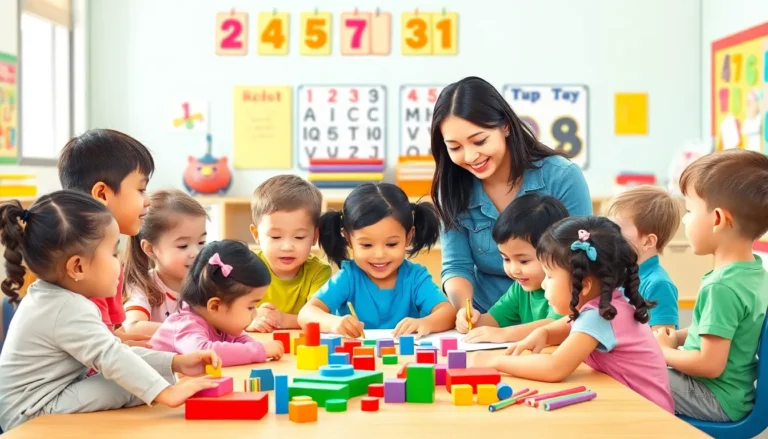Table of Contents
ToggleGetting toddlers excited about math can feel like trying to teach a cat to fetch. But with the right math games, it’s not only possible—it can be a blast! These engaging activities transform numbers into a playful adventure, turning learning into a fun-filled experience.
Imagine your little one counting colorful blocks like a mini architect or sorting shapes like a tiny Picasso. Math games for toddlers stimulate their minds while keeping them entertained. Plus, they’ll be so busy having fun, they won’t even realize they’re learning! So buckle up for a journey filled with laughter and learning, where math becomes a delightful game rather than a daunting task.
Importance Of Math Games For Toddlers
Math games for toddlers play a crucial role in early childhood development. Engaging in these activities enhances cognitive skills essential for future learning. Development of critical thinking occurs naturally through play, allowing children to grasp basic math concepts effortlessly.
Exploration of numbers and patterns improves hand-eye coordination and fine motor skills. Exposure to counting games fosters number recognition, which forms the foundation for advanced mathematical concepts. Sorting activities encourage logical reasoning, helping toddlers classify objects based on size, shape, or color.
Additionally, social interactions during group games improve communication skills. Sharing, taking turns, and problem-solving enrich children’s social experiences. Emotional development also benefits, as success in games boosts confidence and self-esteem.
Studies demonstrate that children who participate in math-related play outperform peers in math readiness assessments. Engaging with math games stimulates curiosity and encourages a positive attitude toward learning. An enjoyable atmosphere transforms potential anxiety about math into excitement.
Incorporating math games into daily routines offers numerous advantages. It integrates learning within familiar environments, ensuring concepts remain relevant. Balancing education and play establishes a strong foundation for lifelong learning.
Ultimately, prioritizing math games for toddlers sets the stage for a successful educational journey. They provide a playful approach to learning that lasts well beyond the toddler years.
Types Of Math Games For Toddlers

Math games come in various forms, each targeting essential skills for toddlers. Engaging in these activities fosters curiosity and builds a foundation for future learning.
Counting Games
Counting games form a critical part of early math education. Children count objects like blocks or toys, which enhances their number recognition. While engaging in these activities, they grasp the concept of quantity more intuitively. For example, using counting songs or interactive apps can make learning numbers exciting. Sorting and grouping objects into sets provides a hands-on experience, reinforcing the importance of quantity. Toddlers gain confidence in their counting abilities through fun and playful methods.
Shape Recognition Games
Shape recognition games stimulate toddlers’ understanding of geometry. Identifying shapes like circles, squares, and triangles helps children classify objects in their environment. Activities like shape sorting or puzzles improve spatial awareness. Incorporating colorful visuals encourages engagement, making learning feel effortless. Matching games provide visual and tactile experiences, linking shapes to real-world items. As toddlers interact with these shapes, they develop essential skills for identifying patterns and relationships.
Simple Addition And Subtraction Games
Simple addition and subtraction games introduce basic arithmetic concepts. Using physical objects such as snacks or toys makes these operations relatable. Through playful interactions, children learn to combine and separate items, enhancing their understanding of numbers. For instance, using fingers to represent numbers can make problems more tangible. Engaging story problems encourage critical thinking while promoting a positive attitude toward math. These games create an enjoyable atmosphere where toddlers can practice foundational math skills effectively.
Benefits Of Playing Math Games
Playing math games offers numerous benefits for toddlers, enhancing both their learning experience and development.
Cognitive Development
Cognitive skills thrive through engaging math games. Activities involving counting and shapes facilitate early math concept understanding. They foster logical thinking and boost memory by encouraging pattern recognition. Toddlers explore numbers through play, making abstract concepts tangible. Engaging interactions with games develop critical thinking skills essential for future learning. Research shows children who play math games grasp mathematical ideas more effectively than peers without such exposure. Experiences with fun activities lay a strong foundation for understanding more complex math principles later on.
Social Skills Enhancement
Social skills benefit significantly from group math games. Toddlers learn to communicate as they share and take turns during gameplay. These interactions promote teamwork and help youngsters navigate social situations with ease. Playing in a group setting encourages problem-solving discussions, enhancing cooperation and collaboration. Successes in these games build self-esteem, while challenges offer valuable lessons in resilience and patience. Studies reveal that children participating in collaborative math activities show improved interpersonal skills and friendships, supporting overall emotional intelligence and social competence.
Improved Problem-Solving Abilities
Problem-solving abilities improve as toddlers engage with math games. When faced with challenges in a game, they learn to devise strategies for finding solutions. These experiences foster resilience and analytical thinking needed for tackling real-life problems. Simple addition or sorting games prompt kids to think critically about their choices and outcomes. As they navigate various scenarios, they develop a mindset geared toward exploration and creativity in approaching challenges. This playful method of learning encourages adaptability, preparing them for more complex problem-solving tasks in the future.
Tips For Parents
Parents play a vital role in enhancing their toddlers’ math skills through engaging activities. Choosing age-appropriate games ensures learning remains fun and effective.
Choosing The Right Games
Selecting games that align with toddlers’ developmental stages fosters interest in math. Look for options that emphasize counting, shapes, and basic problem-solving. Interactive games can spark curiosity and motivate learning. Ensuring that games feature bright colors and engaging visuals captures toddlers’ attention. Educational apps that incorporate playful elements also provide a modern approach to traditional math concepts. Reading reviews and seeking recommendations will help identify high-quality games.
Incorporating Games Into Daily Routine
Integrating math games into everyday life makes learning experiences seamless. Use everyday moments for counting objects, such as toys or snacks, to reinforce skills. Encourage toddlers to help with sorting laundry by color or size, turning chores into engaging activities. Setting aside a specific time for math games during the week creates anticipation and consistency. Incorporating play into mealtimes or family gatherings encourages socialization while learning. Finding simple, quick games keeps toddlers engaged without overwhelming them.
Math games for toddlers are a powerful tool in fostering early learning. By making math enjoyable and interactive, these games help children develop essential skills while having fun. The benefits extend beyond cognitive development to include social and emotional growth, laying a strong foundation for future academic success.
Parents play a crucial role in integrating these activities into daily routines. By selecting age-appropriate games and encouraging group play, they can create a rich learning environment. This approach not only nurtures curiosity but also instills a positive attitude toward math from a young age. Embracing math games can transform the way toddlers perceive learning, making it a delightful journey rather than a daunting task.





